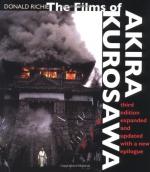|
This section contains 2,673 words (approx. 9 pages at 300 words per page) |

|
SOURCE: "Kurosawa's Humanism," in Kenyon Review, Vol. XXVII. No. 4, Autumn, 1965, pp. 737-42.
[In this essay, Higham examines the central thesis of basic human dignity in Kurosawa's films.]
It is fourteen years now since Akira Kurosawa's masterpiece Rashomon burst on the world, evoking reactions ranging from waspish—"slow, complacent, Louvre-conscious, waiting-for-prizes" (Manny Farber in The Nation)—to ecstatic—"It is a rare cinema treat" (Philip T. Hartung). Today, Kurosawa's reputation, refueled by annual chefs-d'oeuvre, shows no signs of flagging, and no one would raise an eyebrow at the statement that he is a towering figure of the film. What does surprise many people in the West is his enormous popularity in his native country. The Japanese public has a habit of bandying directors' names that is unthinkable almost anywhere else. It is as though British or American fans were to swap encomiums not only for Doris Day, Rock Hudson...
|
This section contains 2,673 words (approx. 9 pages at 300 words per page) |

|


